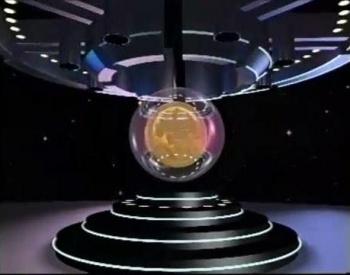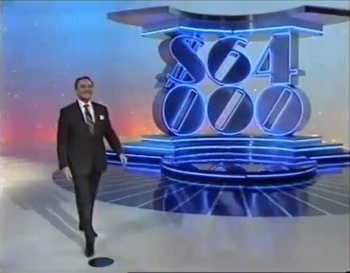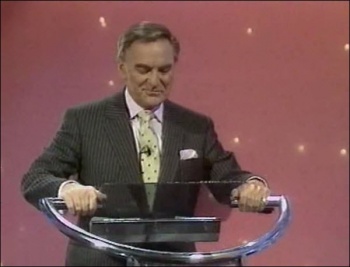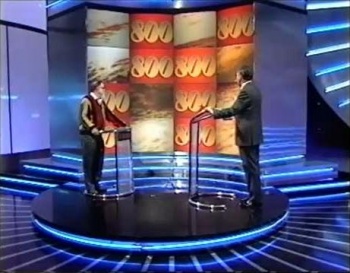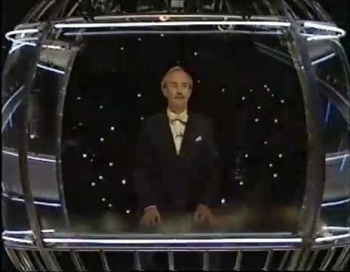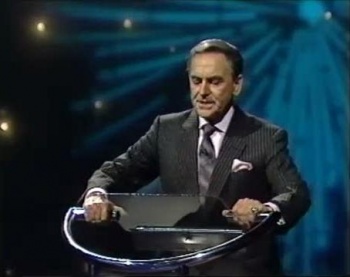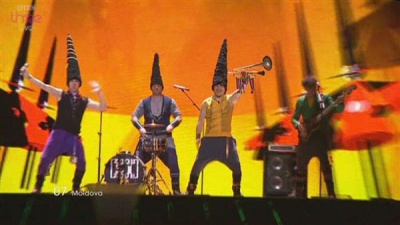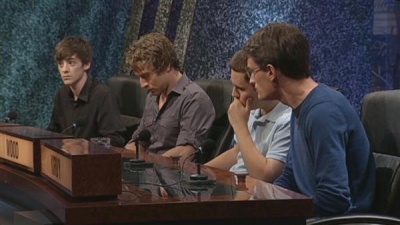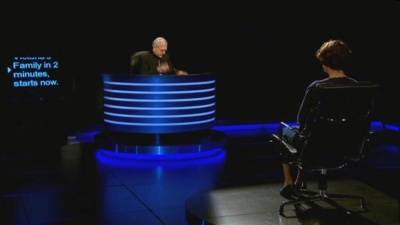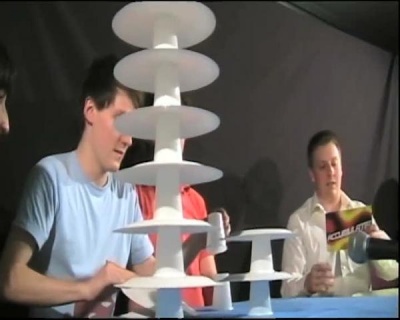Weaver's Week 2012-03-04
Last week | Weaver's Week Index | Next week
Something we want to do is to exploit the great game show archive, to discuss something other than the latest programmes on network television. It's for that reason, and the fact that we really don't have anything to say about Room 101 (other than it should have stayed as Nick Hancock making jokes about Stoke-on-Trent on Radio 5), that we wind back the clock to 1991.
Contents |
The $64,000 Question
Central for ITV, 1990-1993; review based on the episode of 22 November 1991.
That's except for viewers in the BBC Eurovision Department, for whom 1991 is dangerously far in the future. Silver suits and space cars all round? Er, no. What we do have is metallic money: specifically a pound coin. It spins round, gets itself caught in a plastic bubble, placed in the tittle of a question mark, and dropped into a frightening science-fiction contraption. Not unsurprisingly, the coin explodes into the programme's logo, all slanted from left to right.
Soon enough, host Bob Monkhouse walks on set, and stands on his spot. We can tell that it's his spot because it's marked with a spot, it's just that they couldn't well call it The 64 Thousand Dollar Spot. Looking across to the audience, there's the Think Tank, an area of comfortable sofas where contestants may prepare for the night's proceedings.
But before we get to the quizzing, Bob is going to tell some jokes, riffing off this being the last show in the second series. Four good ones in just under a minute. Then he introduces Sheila Autry, she's here to explore her knowledge of Greek myth and legend. On the previous programme, she completed the Basic 64, a series of seven questions, asked in front of the $64,000 logo, doubling her money from that pound coin up to £64.
One further question, reflected onto Bob's reflective glass screen, takes Sheila to £100. See, this is the way to handle questions without using file cards. Electronic gizmoes are going to break, and wireless never works. All you've got to have is a little screen in the floor, and a magnifying glass so that the host can read the questions and answers. You wouldn't catch Bob asking if he can change his glass square.
A visual clue provides inspiration for a two-part question, and Sheila's up to £200. And more jokes from the host. Two questions on a linked topic – daughters of the gods associated with cultivation – put her up to £400. Then three picture questions take her winnings up to £800. Bob offers Sheila the chance to leave, in a catchphrase frenzy. If she succeeds in the next round, she will be assured of £1600, but should she get the question wrong, "you'll walk out the door with just sixty-four". "Do you want to give up or go on?" Sheila decides to go on, and we'll see her again later.
Paul Hammick-Lebrun has chosen "Planets" as his specialist subject. Astute readers will note that these are slightly wider than the chosen subjects on Mastermind, but not tremendously much so. Indeed, it's quite likely that these areas would have been par for the course on Magnus Magnusson's programme over on the other side.
Paul's facing the £1600 question, which is in four parts. These are all about spacecraft that have visited or flown past various planets. As he answers, a picture appears on the video wall, part by part by part. But – arg! – he confuses Jupiter with Uranus, so he's lost the round and just leaves with £64, and the $64,000 money clip.
Paul Campion is our final contender tonight, he's answering questions on Enrico Caruso. For £3200, he must give five answers to questions on a theme – in this case, it's Caruso's opera career. And for these questions, the contender is put into The Isolator, that plastic ball thing we saw in the opening title sequence. Ostensibly, this is so that he can't receive assistance from the audience (cough!), but it's really a device to heighten the dramatic tension.
"This show wants to give everyone a break, and here's yours", says Bob. The show begins immediately after the commercial break, without even so much as a "Welcome back". It's heralded by the show's music – electronic, but with pretentions to be classical, and with upbeat and downbeat stings. It's Ed Welch, of course it's Ed Welch. The next few questions are asked of Sheila again, they're about "a certain" myth – that of Daedalus. She gets it right, and survives the qualification question. "I hope we meet again", says Bob, never taking renewal for granted.
And so it's back to Paul Campion, who wants to use the £6400 to fund a book about Kathleen Ferrier, and will give some to a cancer charity created in her name. A six-part question faces Paul, and he has some novel advantages – he can pass on as many parts as he wishes, and if he gets one of the parts wrong, Bob will bring out a seventh part that he's keeping in reserve.
Thus far, the show has proceeded at a rapid pace – 22 questions, plus five contestant introductions and an opening monologue – in little more than eighteen minutes. Now, the tempo slows dramatically. It's not just the fact that there are things to listen to, but Bob is doing his best to slow down proceedings, dragging them out just a little. When Paul says "Barcelona", Bob pauses, just for a moment, before saying "Barcelona .. is the correct answer". It's not the prolonged gap large enough to drive a truck through, but here we have the beginnings of a style.
In the event, and after some passing, Paul does get all six parts correct. "Is the correct answer; you've won six thousand four hundred pounds!" is the host's remark. The Isolator splits open, Paul emerges, and the title music swells. And the credits roll – we see Paul collect his case full of money as the credits appeal, we see his close friend descend from the audience. What we don't hear is any conversation – the last words spoken were the prize money. Though Bob waves goodbye, we don't hear him say it. That certainly makes for an unusual conclusion.
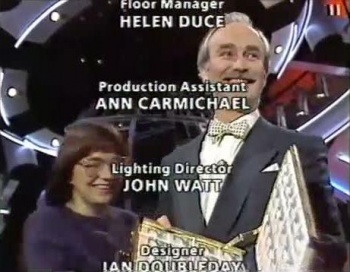 Paul Campion and friend.
Paul Campion and friend.
University Challenge
Phase That Seems To Have Lasted Two Years (Mostly Because It Has) 1e97 / 1e97: Balliol Oxford v UCL
We have to go back to last year for UCL's win, over Manchester; their last performance was defeat to Worcester Oxford. Balliol took their win two weeks ago, defeating Homerton Cambridge for the second time.
"Baldwin!" is the first thing shouted in the competition. Good news for Richard O'Brien, straight through to the next round. Balliol go on to get "charisma" from about one-third of a definition, and are too polite to interrupt Thumper's prolix definition of viral marketing. At the gong... nah, just feels like it. Balliol suggest "Bree" as the land of The Horse and His Boy* in CS Lewis's novel – wasn't that the name of The Horse itself? (comes back and checks) Blimey, good memory.
We were spoiled last week, when the teams got through 106 questions in the 25-and-a-half minutes. This week, Balliol seem determined to get through somewhat fewer questions. Perhaps they're worried about UCL's knowledge of Francophone countries in Africa: that's the first picture round after which Balliol leads 75-25.
Asymptotic series are a bit like University Challenge quarter-finals: they will eventually converge to a solution, but not in anyone's lifetime. They're also the subject of a bonus round, one where Thumper is reading out words without the first clue what they mean. UCL's approach to facts was described as "cavalier" in the introduction – they suggest that the film director whose name means "surrounded by truffles" was Truffaut. It might be right, they're certain not to score on a pass.
Balliol took an early lead, but UCL draw level, and pass their opposition, with questions on flags designed to look a bit like US state flags. The audio round is on tunes from recipients of the Royal Society's Gold Medal for Outstanding Musicianship, after which UCL's lead is 105-85. Is there such a thing as a flying lemur? Really?! "No X-rated puns" asks Jamie Karran of his team on a later question. Ah, why not, UC let a well-known F-word slip fifty years ago.
Is there really a separatist movement in Moldova? All we know about that country is that grannies bang drums, and blokes go round with cones on their heads, and twelve guaranteed points to Romania. We learn everything from the Eurovision Song Contest: Russia is full of attractive young women, Finns wear masks, the Dutch stay in on Saturday night, Ireland's total population is two identical twins, and the UK is watching black-and-white television.
All of which brings us to the second visual round, but no-one knows the painter. UCL leads by 145-100. The Saffir-Simpson scale is hardly used in Herefordshire and Hertfordshire. This might pass as a mnemonic. UCL shout out painters with great confidence, and even greater inaccuracy. They're able to get away with this as they're acing the buzzer race – Balliol got the first four starters of the night, but they've only won one race since. Make that two: the "heptarchy" enables the Oxford college to start closing the gap from 80 points.
Three and a half minutes to go, UCL leads by 60 points, and need two starters and a bonus or two. They get the first starter, but powers in physics only yield five points. UCL suggests that the sex-offender register dates back to the 1950s, and confuses it with the FBI's Most Wanted list. Balliol pick up a starter, and bang out three bonuses in no time at all. But UCL have knowledge of OPEC, and get questions about planets.
"Uranus," shouts Mr. Karran in a manner that Patrick Moore would not approve. When asked for a bird, they suggest "Booby". When asked for a province of Mexico, they call "Yucatan". which is actually correct and not just "name the silliest thing in this category". At the gong, UCL has won, and won by 235-145. For all their larking about, UCL were always the better side, though an overall hit rate of 35/72 is nothing to write home about. Balliol converted the bonuses at a rate of 15/24, but were comprehensively beaten on the buzzers. And in spite of the slow start, we squeezed in 96 questions, of which 58 were correctly answered.
Next match: Worcester Oxford v Manchester
Followed by: Pembroke Cambridge v UCL
We think a Manchester – Pembroke final is most likely, but then we confidently predicted a completely incorrect outcome at this stage last year.
Mastermind
Heat 19
This episode aired in Wales at 6.50 on Saturday, and in Northern Ireland at 7.20 on Saturday.
In the last of the double-bills, Andy Bowman kicks off with the sitcom "Porridge" (1973-7). The series to establish Ronnie Barker as a comedy star, Porridge was a comedy about the prison inmate Norman Stanley Fletcher, warders MacKay (Fulton MacKay) and Barrowclough (Brian Wilde), and new inmate Lenny Godber (Richard Beckinsale). Including the pilot, just 21 episodes were made. Very nearly as many correct answers: 14 (1). Stay inside: the complete series*.
Mary Bucknall is going to tell us about Queen Victoria's Family (est 1837). These royal children get everywhere. Victoria Junior went to Germany, Bertie stayed in England, Alice to Hesse, Alfred to Saxe-Coburg, Helena married a Dane, Louise the Duke of Argyll, Arthur to Sweden, Leopold went to Prussia, and Beatrice wore something strange on her head. Nothing strange about this round, which ends on a perfect 13 (0).
David Buckle discusses the Golfing Stories of PG Wodehouse* (from 1900). The novelist and playwright saw golf as the perfect pastime, and wrote a number of stories about men who agreed that heaven is hitting a small white ball around some grass. One wrong, 14 (0).
Hoping to maintain the high standard is Rebecca Ridolfo, taking the Life and Times of Eliza Lynch (1835-86). A native of Cork, Lynch was the mistress of Francisco Solana López; he was the founder of modern-day Paraguay, leading it against the alliance of Brazil, Uruguay, and Argentina. She was known as 'the richest woman in the world', spending an imperial fortune on her lifestyle. 12 (2). Read more: Anne Enright's biography*.
It's a good score, but it brings Rebecca Ridolfo straight back into the chair. The anthem of France gets the contender rolling, but it seems to be an awfully long time until she gets the next one. Answers never arrive in anything other than a dribble, and the round finishes on 22 (7).
Mary Bucknall is up next. The host made note that this contender is profoundly deaf, and is seeing her questions displayed on an autocue machine just to the left of the host. That doesn't make much difference: that the contender has an unusually slow diction seems to count against her. She does correctly answer the Hidden Double-Bill Indicator of the Week, on Alfred Wainwright, and quite a lot else. The final score is a very creditable 24 (3).
Andy Bowman is next up, kicking off with a statement by Neil Armstrong, a blessing for haggis, and Italy's membership of the Five-to-Six Nations rugby.Then it all goes a bit downhill, he gets just one question in the next minute, closing on 21 (6).
Which means David Buckle needs eleven to win the heat, and that John Marshall is assured a place in the semis, he's currently top of the repechage board. Green belt gives him the first point, but then there's a long string of questions before the next one. He gets the Coronation site in Scotland, and the first song played on Radio 1, but still the points evade him. He reaches 23, the host begins a question just after the buzzer — and the contender is wrong anyway. 23 (1) is not a winning score. He's not going to return to the final, as he did in 2010.
So Mary Bucknall will rejoin us in the semi-finals. Who else makes it? Find out in a moment. Or, if you're in Northern Ireland, a few days. After six weeks of double-bills, we wonder if that's the preferable route, two episodes shown at opposite ends of the week. Less chance of brainbox overload.
Heat 20
This episode was shown at 7.50 on Saturday in Wales, and will air in Northern Ireland at 7pm on Tuesday.
Ruth Green is fifth up tonight, she's taking the Coast to Coast Walk. Devised by Albert Wainwright* in 1968, and popularised by BBC4's Julia Bradbury, the Coast to Coast moves for 190 miles, from St Bees through Whitehaven, Grasmere, Shap, Kirkby Stephen, Muker, Richmond, Northallerton, and Chop Gate, before finally reaching the North Sea at Robin Hood's Bay. There's one pass in the round – somewhat more in the walk – but correct answers outnumber by 15 to 1.
Phil Short has been listening to Pop Music of the 1980s*. Bing bong! Big subject alert! From the Pretenders to Jive Bunny, Culture Club to club culture, the 1980s had a lot of music. It even had a cover of "Venus" by the women of Bananarama, and a group of men called M/A/R/R/S. But nothing by Englebert Humperdinck, mercifully. Yay! The Strawberry Switchblade revival begins here... and ends here. The contender finishes on 12 (0).
Danielle Thom tells us about the Satirical Works of William Hogarth (1697-1764). Apprenticed to a silver engraver, Hogarth befriended the artist James Thornhill, and produced satires of the then-prime minister Robert Walpole. His other works confirmed Walpole's moral crusades, and won him friends in parliament, sufficient to help pass a copyright act. The founder of St Martin Lane's academy died in 1764. The round finishes on 13 (1). More satire: a collection of Hogarth's work*.
And finally! David Love can inform us about the Life and Works of Ralph Vaughan Williams (1872-1958). A pupil of Bruch and Ravel, Vaughan Williams researched English musical heritage, producing acclaimed works such as "A Sea Symphony", "The Lark Ascending", and the score for "Scott of the Antarctic". He was appointed to the Order of Merit in 1935. Though dead for over half a century, he's hotly tipped to write next year's BBC entry for the Eurovision Song Contest. The music is perfection, the contender achieves perfection, 16 (0). His greatest hits*.
It's still number one! Phil Short is back, with the other half of the Double-Bill Indicator, a question on golf. Norman Schwartzkopf and Arthur Daley appear in consecutive questions, then there's a giant rabbit and some bank holidays. We said our brain went a bit wibbly. 23 (2).
Danielle Thom remembers apartheid, perhaps she saw the series on BBC4 recently. She remembers the works of Banksy, and the cast of "James and the Giant Peach", but students rarely score tremendously well on general knowledge, and there's no exception here. 22 (5).
Ruth Green has the Cotswolds and the Kentucky Derby to settle herself in. After a nervy start, the points roll in – Marseille, the taste buds, the Millennium Stadium – but then they start fading again. 24 (5).
David Lowe needs nine to win, and join John Snedden in the semis. Ronnie Biggs and the career of Tintoretto and before we know it, he's more than half-way to the winning post. Philip of Macedonia, the prior Foreign Secretary, and "Good Morning Vietnam" take him through the line, but the minotaur and "Gardener's Question Time" and Glasgow ensure he does something to alarm competitors – 30 (4) is psychologically valuable.
This Week And Next
We regret to report the death of Davy Jones. Best known for his work as one of The Monkees, Jones got his break on British television, and hosted the most recent series of Puzzle Trail.
If it's late February, it must be nominations time for the Royal Television Society awards. Up for the prestigious RTS Daytime Programme of the Year award are Antiques Road Trip and Deal or No Deal Live. The Million Pound Drop Live is going for it in the Entertainment programme category. Entertainment Performance will be won by a game show – James Corden in A League of Their Own, Keith Lemon for Celebrity Juice, and Antan Dec in I'm a Celebrity, Red or Black, Push the Button, and Britain's Got Talent are the entire shortlist. The Great British Bake Off is nominated in the Popular Factual and Features list.
Elsewhere, some changes have been announced to Radio 1's schedule. Bamzooki reject Scott Mills going down, Get 100's Reggie Yates falling away, Greg James moves up, Jameela Jamil off of Playing it Straight gets a show ... ah! We remember Adele Roberts, one of the contenders on Big Brother 2002, and now with a regular show on Radio 1xtra. Another of that year's alumni, Kate Lawler, already has a show on national digital radio. We await Radio Scotland announcing a show of comedy records hosted by Sandy Cumming.
Incredible scenes on Accumulate! this week, as team "Rad-io 2" managed to construct an Accumulatower reaching to the sixth storey. This becomes an all-comers record, and scored the team 21 (twenty-one) points.
Tuesday: there's speculation that ITV is going to renew Red or Black, and make it "a bit more like Noel's House Party". Wednesday: ITV chairman Adam Crozier tells The Media Observer that "The Voice is derivative". We've not been able to obtain a comment from The Kettle.
There's a bidding war going on for the vacant seat on The X Factor. Noel Gallagher from Oasis told the Radio Times that he'd have to be paid a million quid to do the job. But we can save Adam Crozier some money to spend on non-derivative programmes. Bother's Bar said they'd do it for a hundred pounds, and diminutive grimester Lady Sovereign said "I'd judge it for free". Do we have any lower bids? Is anyone prepared to pay for the privilege of sitting between Gary Barlow and Louis Walsh?
Over on UKTV Watch, the cast list for Ballroom With the B-List has been announced. Literally some people will be watching Gladys Knight, Katherine Jenkins, Martina Navratilova, and nine non-entities.
We've been hinting at it all column: the BBC's entry to the Eurovision Song Contest is to be performed by Englebert Humperdinck, and written by James Morrison. We've not heard it, on the grounds it's not been written, but we see absolutely no reason to reserve hotel rooms in Cardiff for May next year.
The week to 19 February saw Let's Dance for Sport Relief take over as the most-watched game show, 6.85m saw the performances, compared with 6.75m for Dancing on Ice. Who Dares Wins recorded 5.35m, Masterchef 5.1m, and Take Me Out 4.9m. University Challenge registered 2.95m on BBC2, Celebrity Juice 2.25m on ITV2, and – here's a blast from the past! – Deal or No Deal was the top game show on Channel 4, 1.8m saw Monday's show.
No other digital show broke a million – Got to Dance was seen by 900,000, Take Me Out The Gossip 780,000, and Pop Idle Us 650,000. Big Ask had 290,000, Big Break 135,000, and Around the Horn's big audience was 5,000; it gets about 900,000 on ESPN-US in the US. 32,000 people saw Nigerian Idol on Hi TV – according to Popjustice, it's got a real member of Shalamar on it. Beat that, The Voice!
The series final of Brain of Britain this week (Radio 4, 3pm Mon). It's also the annual Welsh Song Contest in Can i Gymru (S4C, 7.30 Sunday). The obscure channel Discovery Travel and Living (no, us neither) has Money on the Menu (2pm weekdays), which apparently is some sort of nosh-meets-quiz contest. There's World Athletics on Channel 4, so no Countdown on Friday, but how does Ortis Deley host that from Turkey and appear on Let's Dance for Comic Relief for Sport Relief on the same day?
Links marked with a * help support the UKGameshows servers.
To have Weaver's Week emailed to you on publication day, receive our exclusive TV roundup of the game shows in the week ahead, and chat to other ukgameshows.com readers, sign up to our Yahoo! Group.

